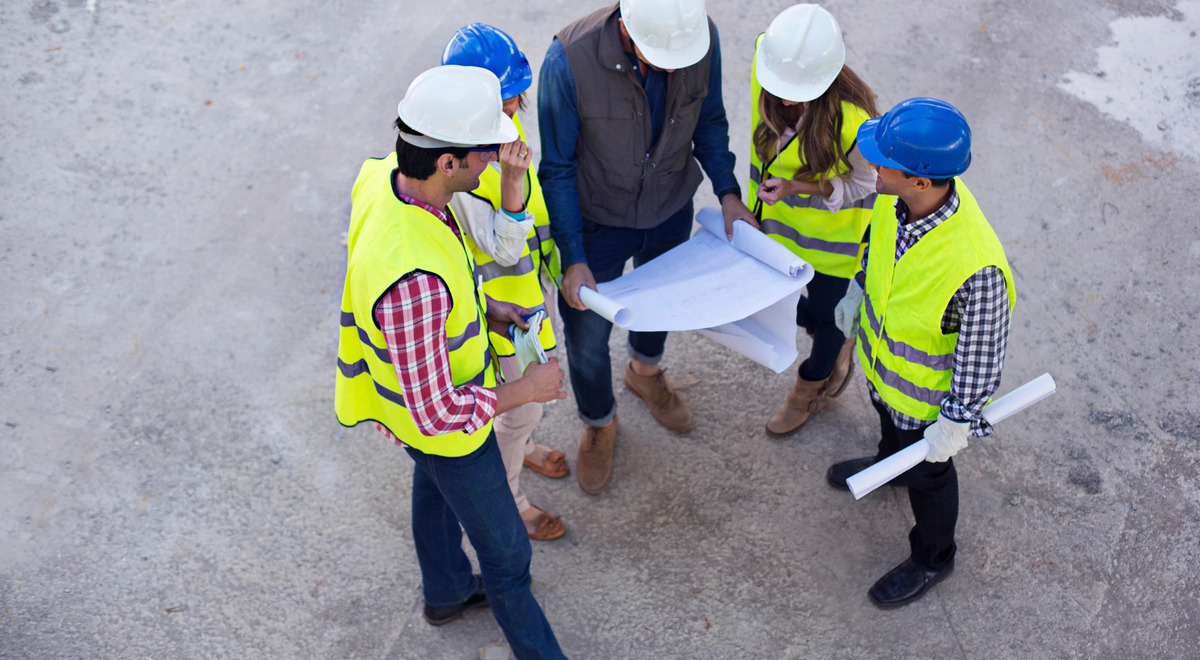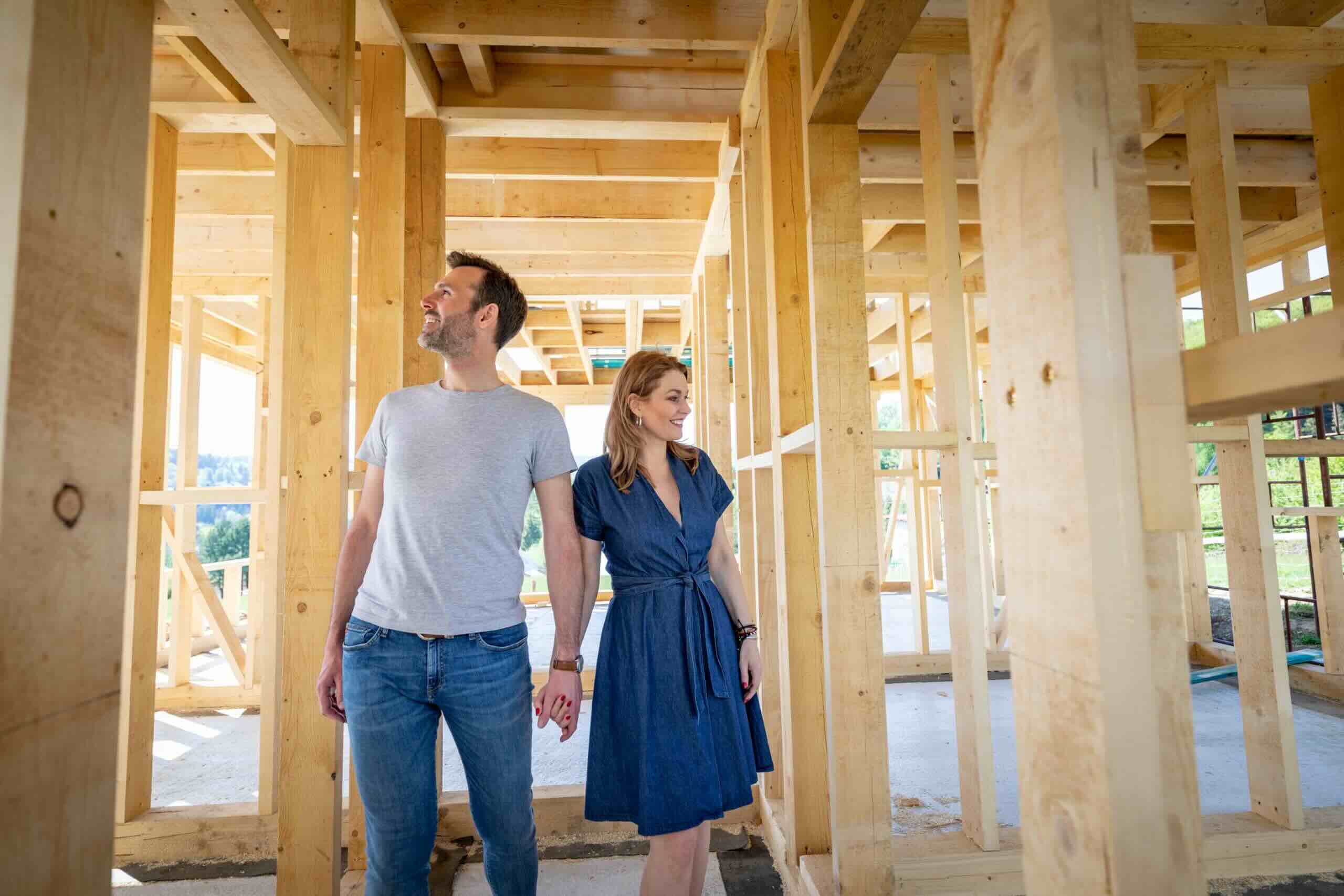Home>diy>Building & Construction>What Is Pre-Construction In Construction


Building & Construction
What Is Pre-Construction In Construction
Modified: December 7, 2023
Learn what pre-construction means in the building construction industry. Discover its benefits and how it can streamline your construction projects.
(Many of the links in this article redirect to a specific reviewed product. Your purchase of these products through affiliate links helps to generate commission for Storables.com, at no extra cost. Learn more)
Introduction
When it comes to constructing a building, there is a lot more involved than just putting up the walls and roof. The process of construction involves several stages, one of which is pre-construction. Pre-construction is the crucial phase that takes place before the actual construction work begins. It is a strategic and comprehensive planning stage where all the necessary groundwork is laid out.
In this article, we will explore what pre-construction in construction entails, its importance, key activities involved, the process followed, as well as the benefits and challenges associated with this phase.
Pre-construction in construction is a crucial phase that occurs before any physical construction work commences. It is the initial planning phase that lays the foundation for a successful construction project. During this phase, the project team works together to identify the project’s requirements, set goals and objectives, and develop a detailed plan. The pre-construction phase involves a wide range of activities, from site selection and feasibility studies to finalizing budgets and securing permits.
So, why is the pre-construction phase so important? Well, it is during this phase that all major decisions are made and potential issues are identified and addressed. It allows for proper planning, coordination, and collaboration among all stakeholders involved, including the owner, architect, engineer, contractors, and suppliers. By investing time and effort in the pre-construction phase, any potential problems or conflicts can be mitigated before they escalate, saving both time and money in the long run.
Key Takeaways:
- Pre-construction in construction is a vital planning phase that sets the stage for successful building projects. It involves thorough assessment, collaboration, and risk mitigation to ensure optimal resource allocation and timely completion.
- Despite its challenges, the pre-construction phase offers numerous benefits, including improved project planning, cost control, clear objectives, and effective collaboration. Addressing challenges through proactive planning and communication is crucial for successful project outcomes.
Read more: What Is A Pre-Construction Meeting
Definition of Pre-Construction in Construction
Pre-construction in construction refers to the phase that occurs before the physical construction work begins on a project. It is a comprehensive planning stage where all the necessary groundwork is laid out to ensure the success of the construction project. During this phase, various activities are carried out to gather information, analyze feasibility, make critical decisions, and establish a solid foundation for the upcoming construction work.
Pre-construction involves a thorough assessment of the project requirements and objectives, site evaluation, risk identification, budget planning, and obtaining necessary permits and approvals. It is during this phase that the project team collaborates and communicates extensively to define project scope, develop schedules, and establish timelines.
The pre-construction phase plays a vital role in aligning all stakeholders involved in the construction project, including the owner, architect, engineer, contractors, and suppliers. It sets the stage for effective collaboration and coordination, ensuring that everyone is on the same page regarding project goals, timelines, and budgetary constraints.
Furthermore, pre-construction involves conducting feasibility studies to assess the viability of the project. Factors such as site conditions, environmental impact, zoning regulations, and potential risks are carefully analyzed to determine the project’s feasibility and identify any potential challenges that may arise during construction. This phase helps in identifying and addressing potential issues early on, minimizing delays and cost overruns during the construction phase.
To summarize, pre-construction in construction encompasses the planning, coordination, and decision-making activities that take place before the physical construction work begins. It involves gathering information, analyzing feasibility, making critical decisions, and establishing a solid foundation for the upcoming construction work. This phase is essential for ensuring the successful execution of the construction project, aligning all stakeholders, and mitigating potential risks and challenges.
Importance of Pre-Construction Phase
The pre-construction phase in construction is of utmost importance for the successful execution of any construction project. It sets the stage for effective planning, coordination, and decision-making, ensuring that all stakeholders are aligned and prepared for the upcoming construction work. Here are some key reasons why the pre-construction phase is crucial:
- Optimal Resource Allocation: During the pre-construction phase, a detailed assessment of the project requirements is conducted. This includes determining the necessary resources such as labor, materials, equipment, and finances. By accurately estimating resource requirements, the pre-construction phase allows for optimal allocation and utilization of resources, thereby eliminating potential delays and cost overruns during the construction phase.
- Feasibility Analysis: One of the primary objectives of the pre-construction phase is to assess the feasibility of the project. Feasibility studies are conducted to evaluate various factors such as site conditions, environmental impact, regulatory compliance, and market conditions. Identifying potential risks and challenges in advance allows for proactive planning and mitigation strategies, reducing the likelihood of unexpected issues arising during construction.
- Budget Planning and Cost Control: Pre-construction involves developing a comprehensive budget for the construction project. This includes estimating costs for materials, labor, permits, and any other project-related expenses. By conducting thorough cost analysis and value engineering during the pre-construction phase, potential cost-saving measures can be identified and implemented. This ensures that the project stays within budget and avoids budget overruns during construction.
- Timely Project Completion: The pre-construction phase lays the groundwork for developing realistic timelines and construction schedules. Assessing the project scope, resource availability, and potential risks allows for accurate scheduling and sequencing of activities. This enables timely completion of the project, as potential delays and bottlenecks are identified and addressed in advance.
- Effective Collaboration and Communication: Pre-construction involves bringing together various stakeholders, including the owner, architect, engineer, contractors, and suppliers. This phase provides an opportunity for effective collaboration and communication among all parties involved. By establishing clear lines of communication, addressing concerns, and aligning objectives, the pre-construction phase fosters a collaborative environment that promotes successful project execution.
In summary, the pre-construction phase in construction is vital for optimal resource allocation, feasibility analysis, budget planning, timely project completion, and effective collaboration. By investing time and effort in the pre-construction phase, construction projects can start on a solid foundation, with minimal risks and a higher likelihood of success.
Key Activities During Pre-Construction
The pre-construction phase in construction involves a range of key activities that are essential for effective planning and preparation before the actual construction work begins. These activities ensure that all necessary groundwork is laid out, potential risks and challenges are identified, and all stakeholders are aligned. Here are the key activities typically carried out during the pre-construction phase:
- Site Evaluation: The first activity in the pre-construction phase is evaluating the project site. This includes assessing the soil conditions, topography, environmental factors, and any potential site constraints that may affect the construction process.
- Feasibility Studies: Feasibility studies are conducted to evaluate the viability and potential risks of the construction project. This involves assessing factors such as market demand, financial feasibility, environmental impact, and regulatory compliance.
- Design Development: During pre-construction, the design development process takes place. This includes collaborating with architects, engineers, and other professionals to further refine and develop the project design. Design coordination, value engineering, and cost estimation are also carried out during this stage.
- Budgeting and Cost Estimation: Developing a comprehensive budget is a crucial activity in the pre-construction phase. This involves estimating the costs associated with labor, materials, permits, equipment, and other project-related expenses. Cost estimation allows for effective allocation of resources and ensures that the project stays within budget.
- Permitting and Approvals: Obtaining necessary permits and approvals is an essential activity during pre-construction. This includes obtaining building permits, environmental clearances, zoning approvals, and any other permits required by local authorities.
- Value Engineering: Value engineering is the process of analyzing and optimizing project costs while maintaining or enhancing quality. During the pre-construction phase, value engineering activities are carried out to identify cost-saving measures, alternative materials, and construction methods without compromising project requirements.
- Scheduling and Sequencing: Developing a detailed construction schedule is another crucial activity. This involves determining the sequence of activities, estimating the time required for each task, and identifying any critical paths or dependencies that may impact the project timeline.
- Risk Assessment and Mitigation: Identifying and assessing potential risks is a critical pre-construction activity. This involves conducting risk assessments to identify potential hazards, such as safety risks, environmental risks, or logistical challenges. Strategies are then developed to mitigate or manage these risks effectively.
- Contractor and Supplier Selection: During pre-construction, the process of selecting contractors and suppliers takes place. This involves evaluating bids, conducting interviews, and selecting the most suitable contractors and suppliers for the project.
- Establishing Project Communication: It is crucial to establish clear lines of communication and collaboration among all stakeholders. During pre-construction, project communication plans are developed to ensure effective communication channels are in place.
These are the key activities involved in the pre-construction phase. By carefully executing these activities, construction projects can be set up for success, with well-planned strategies, effective coordination, and minimized risks and challenges.
Pre-construction in construction refers to the planning and preparation phase before actual building begins. This includes site evaluation, budgeting, scheduling, and obtaining necessary permits. It’s crucial for a successful construction project.
Process of Pre-Construction in Construction
The process of pre-construction in construction involves a series of steps that are followed to ensure proper planning and preparation for the upcoming construction work. These steps ensure that all necessary groundwork is laid out, potential risks are identified and addressed, and all stakeholders are aligned. Here is an overview of the typical process of pre-construction:
- Project Initiation: The pre-construction process begins with project initiation, where the project sponsor or owner defines and articulates the project’s objectives, scope, and constraints. This includes determining the project’s purpose, desired outcomes, budget, and timeline.
- Feasibility Studies: Feasibility studies are conducted to assess the viability and potential risks of the project. This includes evaluating factors such as market demand, financial feasibility, environmental impact, and regulatory compliance. The findings of the feasibility studies help in making informed decisions about moving forward with the project.
- Site Evaluation: The next step is to evaluate the project site. This involves assessing the soil conditions, topography, environmental factors, and any potential site constraints that may impact the construction process. Site evaluations help in determining the suitability and feasibility of the site for the intended project.
- Design Development: Once the site evaluation is complete, the design development phase begins. This involves collaborating with architects, engineers, and other professionals to further refine and develop the project design. Design coordination, value engineering, and cost estimation are carried out during this stage to optimize the design while aligning it with the project objectives and constraints.
- Budgeting and Cost Estimation: Developing a comprehensive budget is a critical step in the pre-construction process. This involves estimating the costs associated with labor, materials, permits, equipment, and other project-related expenses. Cost estimation allows for effective allocation of resources and ensures that the project stays within budget.
- Permitting and Approvals: Obtaining necessary permits and approvals is a crucial step in the pre-construction process. This includes obtaining building permits, environmental clearances, zoning approvals, and any other permits required by local authorities. It is essential to ensure compliance with regulatory requirements before commencing construction.
- Scheduling and Sequencing: Developing a detailed construction schedule is another important step. This involves determining the sequence of activities, estimating the time required for each task, and identifying any critical paths or dependencies that may impact the project timeline. Effective scheduling allows for efficient resource allocation and helps in avoiding delays during construction.
- Risk Assessment and Mitigation: Identifying and assessing potential risks is a crucial step in the pre-construction process. This involves conducting risk assessments to identify potential hazards, such as safety risks, environmental risks, or logistical challenges. Strategies are then developed to mitigate or manage these risks effectively.
- Contractor and Supplier Selection: During pre-construction, the process of selecting contractors and suppliers takes place. This involves evaluating bids, conducting interviews, and selecting the most suitable contractors and suppliers for the project. It is important to choose experienced and reputable professionals who can deliver quality work within the project constraints.
- Establishing Project Communication: Effective communication is essential for successful project execution. During pre-construction, project communication plans are developed to ensure clear lines of communication and collaboration among all stakeholders. This includes regular meetings, progress updates, and a system for addressing any project-related concerns or issues.
- Finalizing the Pre-Construction Plan: Once all the necessary activities have been completed, the pre-construction plan is finalized. This includes compiling all the gathered information, documentation, and plans, which serve as a roadmap for the construction phase. The pre-construction plan acts as a reference document for all stakeholders involved in the project.
By following this systematic process of pre-construction, construction projects can be set up for success, with well-planned strategies, effective coordination, and minimized risks and challenges.
Read more: What Is Pre-Commissioning In Construction
Benefits of Pre-Construction Phase
The pre-construction phase in construction plays a crucial role in ensuring the success of a construction project. It offers numerous benefits that contribute to efficient project execution, cost control, and overall project success. Here are some key benefits of the pre-construction phase:
- Improved Project Planning: The pre-construction phase allows for comprehensive project planning. This involves analyzing project requirements, assessing site conditions, conducting feasibility studies, and developing detailed construction schedules. Through proper planning, potential issues and challenges can be identified, allowing for proactive measures to be taken to mitigate risks and ensure a smoother construction process.
- Cost Control: Pre-construction enables detailed cost estimation and budget planning. By accurately estimating expenses, including materials, labor, permits, and other project-related costs, the pre-construction phase helps in controlling costs throughout the construction process. Value engineering and cost-saving measures can be implemented during this phase to optimize resources and ensure the project stays within budget.
- Clear Project Objectives: During pre-construction, project objectives are clearly defined, and all stakeholders are aligned. This ensures that everyone involved in the project understands the goals, scope, and constraints from the beginning. Clear project objectives facilitate effective communication, collaboration, and decision-making, ultimately leading to successful project outcomes.
- Improved Collaboration: The pre-construction phase fosters collaboration among all stakeholders, including the owner, architect, engineer, contractors, and suppliers. Through effective communication and coordination, potential conflicts or misunderstandings can be addressed, facilitating a seamless construction process. Collaboration during the pre-construction phase sets the foundation for strong teamwork and partnerships, ensuring smoother project execution.
- Risk Mitigation: Pre-construction allows for the identification and mitigation of potential risks and challenges before construction begins. By conducting thorough assessments and feasibility studies, potential issues such as environmental risks, site limitations, or regulatory compliance can be identified and addressed. Risk mitigation strategies can be put in place, minimizing the likelihood of delays or disruptions during the construction phase.
- Optimized Resource Allocation: Through proper planning, the pre-construction phase enables optimized resource allocation. By accurately estimating resource requirements and analyzing project schedules, the availability of labor, materials, and equipment can be planned effectively. Proper resource allocation ensures that construction activities progress smoothly, avoiding unnecessary delays and cost overruns.
- Quality Assurance: Pre-construction ensures that quality standards are upheld from the very beginning of the project. By identifying and addressing potential quality issues during the planning phase, construction processes and materials can be carefully chosen and monitored to meet project requirements. This focus on quality assurance contributes to the overall success and longevity of the constructed facility.
- Timely Project Completion: With well-defined schedules and careful planning, the pre-construction phase helps in ensuring timely project completion. Potential project bottlenecks or delays are identified and addressed during this phase, allowing for efficient project management and construction sequencing. By setting realistic timelines and managing potential risks, timely project completion can be achieved.
In summary, the pre-construction phase offers numerous benefits including improved project planning, cost control, clear project objectives, collaboration, risk mitigation, optimized resource allocation, quality assurance, and timely project completion. By investing time and effort in thorough pre-construction activities, construction projects can be set up for success, leading to efficient construction processes and successful project outcomes.
Challenges in Pre-Construction
The pre-construction phase in construction comes with its fair share of challenges. These challenges can arise due to various factors, including project complexity, site conditions, regulatory requirements, and stakeholder dynamics. It is important to anticipate and address these challenges to ensure a smooth transition from the pre-construction phase to the construction phase. Here are some common challenges encountered during the pre-construction phase:
- Unclear Project Requirements: Lack of clarity in project requirements can pose a significant challenge during pre-construction. Ambiguities or gaps in the project scope can lead to misunderstandings, delays, and cost overruns. It is essential to have a thorough understanding of the project objectives and ensure effective communication with all stakeholders to avoid such issues.
- Availability of Information: Obtaining accurate and complete information during pre-construction can be challenging. This includes site information, existing infrastructure data, environmental assessments, and permits. Incomplete or outdated information can lead to errors in planning and decision-making. It is important to conduct thorough site investigations and engage with relevant experts to gather all necessary information.
- Site Constraints and Conditions: Site constraints and adverse site conditions can pose challenges during pre-construction. Soil instability, difficult topography, environmental sensitivities, or inadequate utility infrastructure can impact project feasibility and design. It is crucial to conduct comprehensive site evaluations and feasibility studies to identify and address these challenges early on.
- Regulatory Compliance: Meeting regulatory requirements and obtaining the necessary permits and approvals can be a complex and time-consuming process. Navigating through various regulations, zoning restrictions, and environmental compliance can cause delays and add to the overall project cost. It is important to engage with experienced professionals and regulatory authorities to ensure compliance from the outset.
- Managing Stakeholder Expectations: The pre-construction phase involves multiple stakeholders, each with their own expectations and priorities. Balancing the interests and requirements of owners, architects, engineers, contractors, and other parties can be challenging. Effective communication, collaboration, and negotiation skills are necessary to ensure alignment and avoid delays or conflicts.
- Budget Constraints: Budget constraints are a common challenge in construction projects. It can be difficult to balance project requirements and quality standards within the allocated budget. Value engineering and cost optimization techniques can help address these challenges, but careful planning and decision-making are essential to avoid compromising project objectives.
- Changes in Design or Scope: Changes in design or scope during the pre-construction phase can cause disruption and delays. Scope changes can impact the project schedule, budget, and resource allocation. Effective change management processes, clear communication, and proactive risk management are required to mitigate the impact of changes without compromising project objectives.
- Resource Availability: Availability of labor, materials, and equipment can present challenges during pre-construction. Limited resources and fluctuations in market conditions can impact project timelines and costs. Effective resource planning, engagement with reliable suppliers, and ongoing monitoring of market conditions are crucial to address these challenges.
While pre-construction challenges are inevitable, proactive planning, effective communication, and collaboration among all stakeholders can help mitigate these challenges. By identifying potential hurdles in advance and implementing appropriate strategies, construction projects can navigate the pre-construction phase successfully and set the stage for a smooth transition into the construction phase.
Conclusion
The pre-construction phase in construction is a critical stage that sets the foundation for a successful construction project. It involves comprehensive planning, feasibility assessment, and coordination among all stakeholders involved. By investing time and effort in the pre-construction phase, construction projects can be set up for success, with well-planned strategies, effective coordination, and minimized risks and challenges.
During the pre-construction phase, key activities such as site evaluation, feasibility studies, budgeting, and scheduling are carried out. These activities ensure optimal resource allocation, improved collaboration, and timely project completion. The pre-construction phase also offers benefits like improved project planning, cost control, clear project objectives, risk mitigation, and quality assurance.
However, the pre-construction phase is not without its challenges. Unclear project requirements, availability of information, site constraints, regulatory compliance, managing stakeholder expectations, budget constraints, changes in design or scope, and resource availability can all pose challenges. Addressing these challenges requires proactive planning, effective communication, and collaboration among all stakeholders.
In conclusion, the pre-construction phase is a crucial stage in construction projects. It is during this phase that project objectives are defined, detailed planning is carried out, potential risks are identified and addressed, and stakeholders are aligned. By investing time and effort in the pre-construction phase, construction projects can start on a solid foundation, with well-coordinated efforts, minimized risks, and improved chances of success. Successful completion of the pre-construction phase sets the stage for a smooth transition into the construction phase, ultimately leading to the timely and successful completion of the construction project.
Frequently Asked Questions about What Is Pre-Construction In Construction
Was this page helpful?
At Storables.com, we guarantee accurate and reliable information. Our content, validated by Expert Board Contributors, is crafted following stringent Editorial Policies. We're committed to providing you with well-researched, expert-backed insights for all your informational needs.















0 thoughts on “What Is Pre-Construction In Construction”